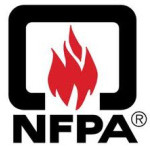- Industry: Fire safety
- Number of terms: 98780
- Number of blossaries: 0
- Company Profile:
Established in 1896, NFPA's mission is to reduce the worldwide burden of fire and other hazards on the quality of life by providing and advocating consensus codes and standards, research, training, and education.
Products of combustion that are illuminated by the heat of combustion and accompany the burning of most materials in normal atmospheres.
Industry:Fire safety
Product that meets or exceeds all applicable requirements of this standard and is certified.
Industry:Fire safety
Product of decomposition through heat; a product of a chemical change caused by heating.
Industry:Fire safety
Procedures for cleaning, decontamination, and storage of protective ensembles and ensemble elements.
Industry:Fire safety
Procedures by which a manufacturer identifies a product, provides notice or safety alert, and repairs or withdraws the product as the corrective action.
Industry:Fire safety
Probability distribution quantifying the analyst’s state of knowledge regarding the parameter to be estimated prior to collection of new data.
Industry:Fire safety
Private fire service main, as used in this standard, is that pipe and its appurtenances on private property (1) between a source of water and the base of the system riser for water-based fire protection systems, (2) between a source of water and inlets to foam-making systems, (3) between a source of water and the base elbow of private hydrants or monitor nozzles, and (4) used as fire pump suction and discharge piping, (5) beginning at the inlet side of the check valve on a gravity or pressure tank.
Industry:Fire safety
Prioritizes, initiates, and coordinates the response of public safety agencies; manages the flow of incident related information to and from field units and/or public safety resources; monitors status of field units and assigns additional resources as requested and/or required.
Industry:Fire safety
Prime movers such as internal combustion engines, external combustion engines, gas turbine engines, rotary engines, and free piston engines using either gaseous fuels or liquid fuels, or combinations thereof.
Industry:Fire safety
Preventive activities that identify real and potential health risks in the work environment and that inform, motivate, and otherwise help people to adopt and maintain healthy practices and lifestyles.
Industry:Fire safety
